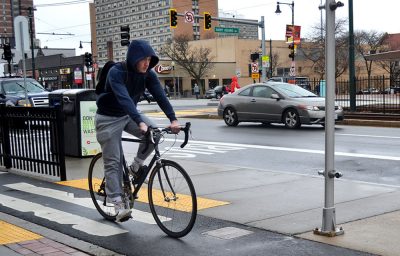
A bill to regulate and encourage the use of electric bicycles in Massachusetts was referred to the State Senate Ways and Means Committee on Monday.
State Representative Steven Owens said “An Act Relative to Electric Bicycles” — the name of the bill — will define three new classes of e-bikes.
“Every e-bike is classified as a motorized bicycle,” he said. “So that includes the pedal assist bikes, which only run the motor while you’re pedaling [and] have a top speed of 20 [miles per hour], you can’t go faster than that.”
Pedal assist bikes would be considered the first class of e-bikes. The second class covers e-bikes that provide assistance to riders even when the rider is not pedaling, but still travels only up to 20 mph. The final class includes e-bikes that only provide assistance to riders when they are pedaling but allows the rider to reach up to 28 mph.
Owens — a sponsor of the House version of the bill — said the goal of the legislation was to define “what is a bike and what’s not” so lawmakers can start paving the way to include more e-bikes into the city and reduce traffic pollution.
“It’s important for us, if we’re going to meet our climate goals, to give people the option to use cleaner transportation,” Owens said. “And an e-bike is clean, it’s green, it is an order of magnitude cheaper than an electric car and also takes up less space in traffic.”
Owens described the possibilities e-bikes offer for commuters and businesses alike.
“I really think it’s a great solution for things like small deliveries, it’s a great solution for commuting, expanding the range of what’s commutable for cyclists,” Owens said. “I’m really hopeful that we will be able to put this framework into law so we can have these conversations.”
Eliza Parad — the director of organizing and operations at Boston Cyclists Union who advocated for the bill — said e-bikes have become more popular over the pandemic.
“A lot of people who were taking public transit, commuter rail, longer seven-plus mile commutes switched to using e-bikes,” Parad said.
Another bill — “An Act Relative to Electric Bicycle Rebates” — will also provide rebates of up to $750 for residents to purchase e-bikes.
However, according to Owens, one issue is that, since all e-bikes are currently classified as motorized bicycles and thus are not allowed on bike paths and are subject to licensing requirements from the Registry of Motor Vehicles, this can create major hurdles for e-bike users.
Parad said it is “legally unclear” where e-bikes are currently allowed.
“[E-bike users] are currently biking where bicycles already are, so bike lanes and bike paths, but there’s definitely some confusion there,” Parad said.
Tiffany Cogell — a co-organizer for Ride for Black Lives Boston — said while she looks forward to the bill being passed, she wished legislators could include language that would allow for undocumented riders and riders with disabilities.
“Just like you can go out and buy a regular bike and you don’t have to worry about being regulated, I believe that should be the case with e-bikes as well,” Cogell said.
Owens said pedestrians’ concerns about sharing paths with e-bikes cannot be addressed until there is a legal definition of what an e-bike is.
“Things like speed limits on these paths, or deciding that we want the simple pedal-assist bikes and the slower e-bikes but not the larger cargo bikes, these are conversations that we can have, but we can’t even begin to make those decisions until the classification of e-bikes is enshrined in law,” Owens said.
Parad said e-bikes will be more accessible if Boston’s Bluebikes fleet is expanded to include them.
“Bluebikes, which is the operator of the Greater Boston bike share program, can’t add electric bicycles into their fleet, like New York City, New Orleans and many other cities have in their bike shares, which get a lot more people riding bikes,” Parad said.
Owens said 46 other states have similar classifications in the law and called Massachusetts “way behind” on e-bikes.
“The most important thing about this legislation is that it gets us into the 21st century of cycling,” Owens said.















There are already classifications:
– Class 1 (MTBe): No Throttle, 20MPH limit
– Class 2 and 3 (EBikes): Throttle 20MPH / 28MPH limits
It is somewhat simple.
– MTBe/Class1 should be regulated like any MTB (offroad) / Bicycle (road/gravel)
– Class 2 and 3 should be allowed and Parallel Regulated
* Motorized Pathways Only (On/Off Road)
* If used as a Commuter, Register same as 50CC Mopeds
ADA already trumps Access Rules.